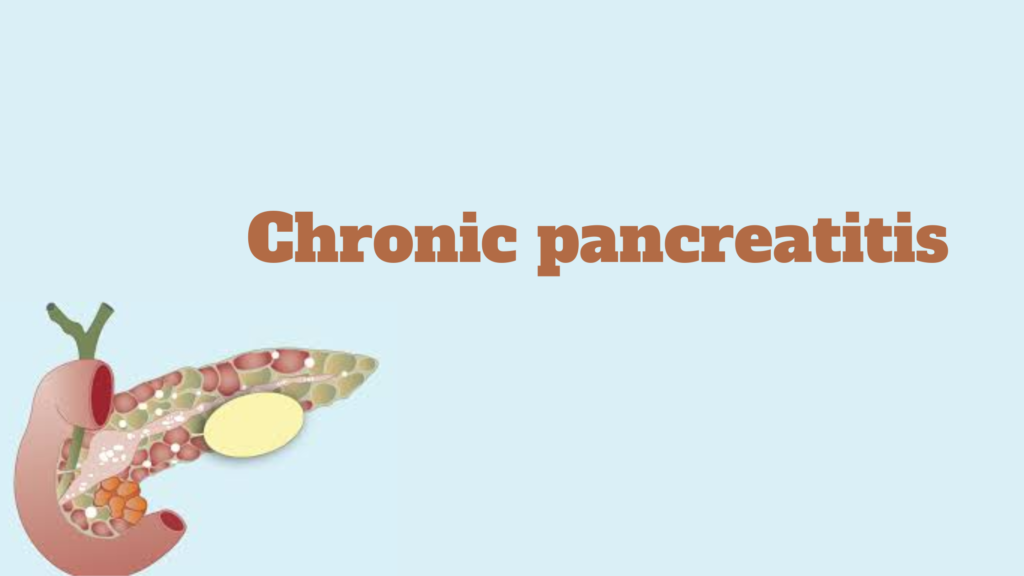Chronic pancreatitis is a progressive, irreversible inflammation of the pancreas that leads to permanent damage and loss of function. Unlike acute pancreatitis, which is a sudden inflammation, chronic pancreatitis develops over time and often results in persistent abdominal pain, digestive issues, and complications such as diabetes and malnutrition.
🔍 Causes and Risk Factors
The primary causes of chronic pancreatitis include:(nypost.com)
- Chronic alcohol consumption: Heavy drinking over many years is the leading cause in adults.
- Smoking: Smoking significantly increases the risk and accelerates disease progression.
- Genetic mutations: Inherited mutations, such as in the PRSS1 gene, can lead to hereditary pancreatitis. (pmc.ncbi.nlm.nih.gov)
- Autoimmune conditions: Autoimmune pancreatitis occurs when the body’s immune system attacks the pancreas.
- Obstruction of pancreatic ducts: Conditions like gallstones or tumors can block the pancreatic ducts, leading to inflammation. (aafp.org)
- Idiopathic cases: In some instances, no clear cause can be identified.
⚠️ Symptoms
Common symptoms of chronic pancreatitis include:
- Persistent abdominal pain: Often in the upper abdomen, which may radiate to the back.
- Digestive issues: Nausea, vomiting, and diarrhea.
- Weight loss: Despite normal or increased appetite.
- Steatorrhea: Fatty, foul-smelling stools due to malabsorption.(medanta.org)
- Jaundice: Yellowing of the skin and eyes.
- Diabetes: Develops when insulin-producing cells are damaged.(medanta.org)
🩺 Diagnosis
Diagnosis involves:
- Imaging tests: CT scans, MRI, or endoscopic ultrasound to visualize pancreatic damage.
- Blood tests: To check for elevated pancreatic enzymes and other markers.
- Stool tests: To assess for malabsorption.(mayoclinic.org)
- Genetic testing: If hereditary pancreatitis is suspected.(pubmed.ncbi.nlm.nih.gov)
💊 Treatment Options
While the damage is irreversible, treatment focuses on managing symptoms and complications:
- Pain management: Includes non-opioid analgesics, antidepressants, and in some cases, opioids. (aafp.org)
- Pancreatic enzyme replacement therapy (PERT): To aid digestion and prevent malnutrition.
- Insulin therapy: For patients who develop diabetes.
- Dietary modifications: Low-fat, small, frequent meals to reduce symptoms.(aafp.org)
- Lifestyle changes: Abstaining from alcohol and smoking. (cedars-sinai.org)
- Surgical interventions: Procedures like lateral pancreaticojejunostomy or Whipple surgery may be considered for severe cases. (pubmed.ncbi.nlm.nih.gov)
⚠️ Complications
Potential complications include:
- Pancreatic insufficiency: Leading to malabsorption and weight loss.
- Diabetes: Due to damage to insulin-producing cells.
- Pancreatic cancer: Chronic inflammation increases the risk.
- Pseudocysts: Fluid collections that can become infected or rupture.
- Bile duct obstruction: Leading to jaundice and other issues.
🛡️ Prevention
Preventive measures include:
- Limiting alcohol intake: Avoiding excessive drinking.
- Quitting smoking: To reduce risk and slow disease progression.
- Healthy diet: Low in fat and high in nutrients.
- Regular medical check-ups: For early detection and management.
If you or someone you know is experiencing symptoms of chronic pancreatitis, it’s crucial to consult a healthcare professional for proper diagnosis and management.
